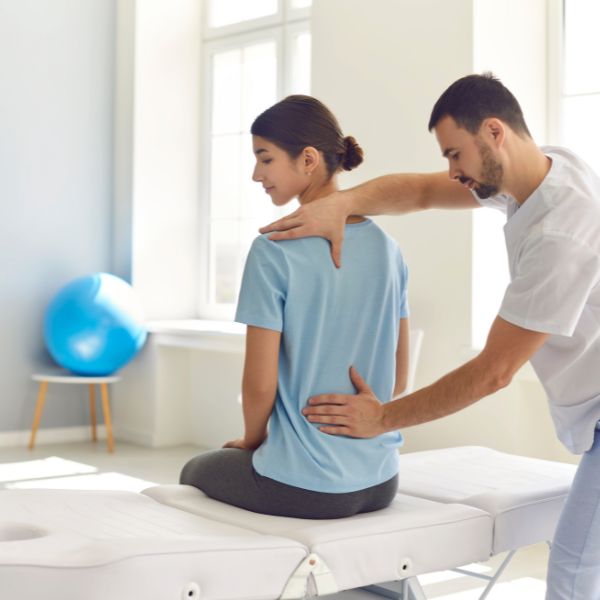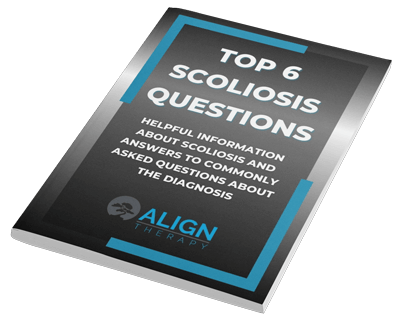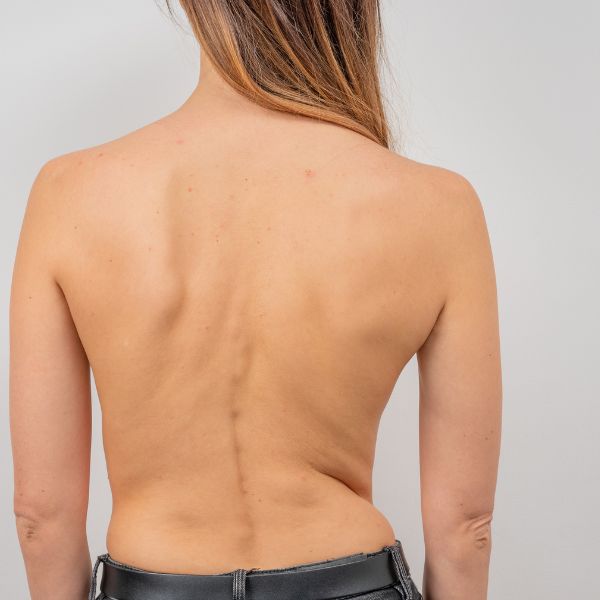Get Relief From Scoliosis Pain With Our Expert Physical Therapy Care
- Conveniently located in Lehi, UT
- 230 North 1200 East, #103, Lehi, UT 84043
- Monday - Thursday - 7.00am - 6.00pm
- Friday - 7:00am - 5.00pm


Download Your FREE Scoliosis Pain Guide:
Top 6 Scoliosis Questions
- Click the button below to get your FREE Guide
Physical therapy care along with specialized treatments for patients of all ages.
Does any of this sound familiar?
- Do you experience scoliosis pain when you get up in the morning or after sitting for a while?
- Have you visited multiple clinics, but still can't find relief from your scoliosis pain?
- Have you invested a lot of money in treatment that didn't alleviate your scoliosis pain?
- Are you avoiding exercise due to the fear of aggravating your scoliosis pain?
- Are you starting to worry that you'll never recover from your scoliosis pain and won't be able to enjoy the activities you love?
- Has a medical professional suggested that surgery, painkillers and injections are the next step in treating your scoliosis pain?
If you answered YES to any of the above, you may have found the answer to your neck pain at Align Therapy, Utah.
Got a Question?
Ask Align Therapy, Utah And Our Team Of Expert Physical Therapists
What Causes Scoliosis Pain?... And Why is My Scoliosis Pain Not Getting Better?
Scoliosis pain is typically caused by the abnormal curvature of the spine, which puts uneven stress on muscles, joints, nerves, and internal structures. Not everyone with scoliosis experiences pain, but when it does occur, these are the main causes:
Muscle Imbalance and Fatigue
Joint and Spine Degeneration
Nerve Compression
Postural Strain
Poor Sleep Positioning
Psychological Stress
Secondary Conditions
If your scoliosis pain isn’t getting better, it’s often because the underlying mechanical issues of the spine haven’t been fully addressed, or other factors are interfering with your recovery. Here’s a breakdown of why scoliosis pain can persist:
Progression of the Curve
Improper or Incomplete Treatment
Poor Posture or Ergonomics
Lack of Core Strength or Flexibility
Nerve Involvement
Chronic Pain Sensitization
Skipping or Inconsistency in Treatment

Tired of Living with Scoliosis Pain? We Can Help

- Fill in the form to request a Call From Our Team Of Expert Physical Therapists
- One of our team members will call you for FREE and answer any questions or concerns you may have about your scoliosis pain
What Are The Symptoms of Scoliosis Pain?

Scoliosis pain can present in a variety of ways depending on the severity of the curve, age, and whether nerves or muscles are involved. While scoliosis itself is a spinal curvature, the pain symptoms often come from how that curvature affects the rest of the body.
Here are the common symptoms of scoliosis-related pain:
Chronic Back Pain
Muscle Imbalance or Tightness
Radiating Leg Pain (Sciatica-Like Symptoms)
Fatigue and Postural Pain
Localized Stiffness or Tenderness
Visible Changes That May Be Linked to Discomfort
Pain That Worsens with Certain Activities
Is Physical Therapy Right For Your Scoliosis Pain?
- Our team at Align Therapy, Utah are experts in pain treatment, helping 100's of patients get back to the activities they love with relief from their pain.
Here’s just a few of the things our Team can do for you:
- We can help quickly relieve your pain and stiffness, often within just a couple of sessions.
- On day one, we can inform you of what you have, why you have it, and how to get rid of it, so you can feel confident and informed about your treatment.
- We can help you discover what's truly causing your scoliosis pain and address the root issue, sometimes in as little as 20 minutes.
- Our treatments can help give you more energy to enjoy each day to the fullest.
- We can help you say goodbye to taking harmful painkillers long-term and find a more effective solution.
- Our treatments can help you avoid surgery and painful injections.
- We can help you skip the doctor's waiting room and avoid repeated visits to get more prescriptions.
- We want to help you reclaim the quality time with family and friends that your scoliosis pain may have taken away.
- Our goal is to help you stay active and enjoy a fulfilling life, free from the curse of your scoliosis pain.
What’s next? You’ve got a decision to make – another month gone without solving your scoliosis problem, or are you ready to get back to doing the things you love?
Why Patients Choose Us:
Having served the people of Lehi, Utah and receiving overwhelming feedback from patients as to why they choose us include:
- Award Winning Patient Care
- Early morning and evening availability
- Gentle, safe and effective health care
- Free Discovery Visits
- Highly trained and caring staff
Frequently Asked Questions About Neck Pain
Scoliosis pain is usually caused by muscle strain, joint stress, or nerve compression due to the abnormal spinal curvature. Asymmetrical posture and spinal degeneration can also play a role.
Common pain areas include:
Lower back (most frequent)
Shoulders or neck
Hips
Legs (if nerves are involved)
No. Many people—especially children and teens—have no pain. Pain becomes more common in adults, especially if the curve worsens or causes degeneration.
Yes. If the curve compresses spinal nerves, it can cause:
Sharp or shooting pain
Numbness or tingling
Leg or foot weakness
It may feel:
Achy or sore in the back or hips
Sharp or stabbing if nerves are involved
Tight or fatigued in one-sided muscles
Worse after prolonged sitting or standing
Worsening pain could be due to:
Curve progression
Muscle imbalance or poor posture
Age-related disc or joint degeneration
Nerve compression
Yes. Many cases improve with:
Physical therapy
Stretching and core strengthening
Posture training
Pain management techniques
Surgery is usually only considered for severe or worsening cases.
Yes—if it’s scoliosis-specific. General exercise may help, but targeted therapy like the Schroth Method is more effective in reducing pain and improving posture.
Orthopedic spine specialist for diagnosis and treatment planning
Physical therapist (preferably trained in scoliosis treatment)
Pain management specialist if the pain is chronic or complex
Are You Struggling With Neck Pain? Take Us Up on One of Our FREE Options
Align Therapy, Utah
- 230 North 1200 East, #103, Lehi, UT 84043
- (801) 980-0860
- info@aligntherapyutah.com

© Copyright Align Therapy, Utah. All Rights Reserved.